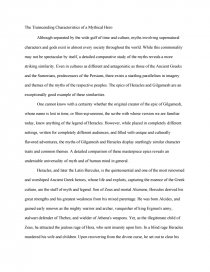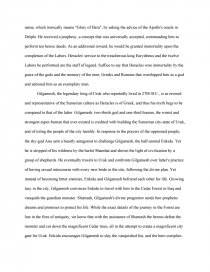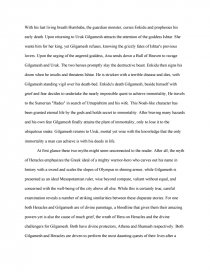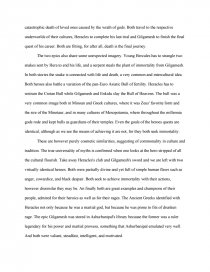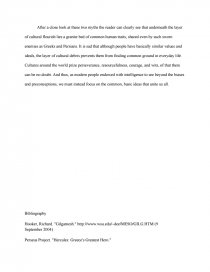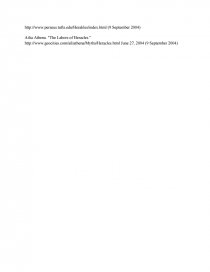The Transcending Characteristics of a Mythical Hero
Essay by review • October 27, 2010 • Essay • 1,513 Words (7 Pages) • 1,910 Views
Essay Preview: The Transcending Characteristics of a Mythical Hero
The Transcending Characteristics of a Mythical Hero
Although separated by the wide gulf of time and culture, myths involving supernatural characters and gods exist in almost every society throughout the world. While this commonality may not be spectacular by itself, a detailed comparative study of the myths reveals a more striking similarity. Even in cultures as different and antagonistic as those of the Ancient Greeks and the Sumerians, predecessors of the Persians, there exists a startling parallelism in imagery and themes of the myths of the respective peoples. The epics of Heracles and Gilgamesh are an exceptionally good example of these similarities.
One cannot know with a certainty whether the original creator of the epic of Gilgamesh, whose name is lost in time, or Shin-eqi-unninni, the scribe with whose version we are familiar today, knew anything of the legend of Heracles. However, while placed in completely different settings, written for completely different audiences, and filled with unique and culturally flavored adventures, the myths of Gilgamesh and Heracles display startlingly similar character traits and common themes. A detailed comparison of these masterpiece epics reveals an undeniable universality of myth and of human mind in general.
Heracles, and later the Latin Hercules, is the quintessential and one of the most renowned and worshiped Ancient Greek heroes, whose life and exploits, capturing the essence of the Greek culture, are the stuff of myth and legend. Son of Zeus and mortal Alcmene, Hercules derived his great strengths and his greatest weakness from his mixed parentage. He was born Alcides, and gained early renown as the mighty warrior and archer, vanquisher of king Erginus's army, stalwart defender of Thebes, and wielder of Athena's weapons. Yet, as the illegitimate child of Zeus, he attracted the jealous rage of Hera, who sent insanity upon him. In a blind rage Heracles murdered his wife and children. Upon recovering from the divine curse, he set out to clear his name, which ironically means "Glory of Hera", by asking the advice of the Apollo's oracle in Delphi. He received a prophesy, a concept that was universally accepted, commanding him to perform ten heroic deeds. As an additional reward, he would be granted immortality upon the completion of the Labors. Heracles' service to the treacherous king Eurystheus and the twelve Labors he performed are the stuff of legend. Suffice to say that Heracles won immortality by the grace of the gods and the memory of the men, Greeks and Romans that worshipped him as a god and admired him as an exemplary man.
Gilgamesh, the legendary king of Uruk who reportedly lived in 2700 B.C., is as revered and representative of the Sumerian culture as Heracles is of Greek, and thus his myth begs to be compared to that of the latter. Gilgamesh, two-thirds god and one-third human, the wisest and strongest super-human that ever existed is credited with building the Sumerian city-state of Uruk, and of ruling the people of the city harshly. In response to the prayers of the oppressed people, the sky-god Anu sent a beastly antagonist to challenge Gilgamesh, the half-animal Enkidu. Yet he is stripped of his wildness by the harlot Shamhat and shown the light of civilization by a group of shepherds. He eventually travels to Uruk and confronts Gilgamesh over latter's practice of having sexual intercourse with every new bride in the cite, following the divine plan. Yet instead of becoming bitter enemies, Enkidu and Gilgamesh befriend each other for life. Growing lazy in the city, Gilgamesh convinces Enkidu to travel with him to the Cedar Forest in Iraq and vanquish the guardian monster. Shamash, Gilgamesh's divine progenitor sends him prophetic dreams and promises to protect his life. While the exact details of the journey to the Forest are lost in the fires of antiquity, we know that with the assistance of Shamash the heroes defeat the monster and cut down the magnificent Cedar trees, all in the attempt to create a magnificent city gate for Uruk. Enkidu encourages Gilgamesh to slay the vanquished foe, and the hero complies. With his last living breath Humbaba, the guardian monster, curses Enkidu and prophesies his early death. Upon returning to Uruk Gilgamesh attracts the attention of the goddess Ishtar. She wants him for her king, yet Gilgamesh refuses, knowing the grizzly fates of Ishtar's previous lovers. Upon the urging of the angered goddess, Anu sends down a Bull of Heaven to ravage Gilgamesh and Uruk. The two heroes promptly slay the destructive beast. Enkidu then signs his doom when he insults and threatens Ishtar. He is stricken with a terrible disease and dies, with Gilgamesh standing vigil over his death-bed. Enkidu's death Gilgamesh, beside himself with grief and fear decides to undertake the nearly impossible quest to achieve immortality, He travels to the Sumerian "Hades" in search of Utnapishtim and his wife. This Noah-like character has been granted eternal life by the gods and holds secret to immortality. After braving many hazards and his own fear Gilgamesh finally attains the plant of immortality, only to lose it to the ubiquitous snake. Gilgamesh returns to Uruk, mortal yet wise with the knowledge that the only immortality a man can achieve is with his deeds in life.
At first glance these two myths might seem unconnected to the reader. After all, the myth of Heracles emphasizes the Greek ideal of a mighty warrior-hero who carves out his name in history with a sword and scales the slopes of Olympus in shining armor, while Gilgamesh is presented as an ideal Mesopotamian ruler, wise beyond compare, valiant without equal, and concerned with the well-being of the city above all else. While this is certainly true, careful examination reveals a number of striking similarities between these disparate stories. For one both Heracles and Gilgamesh are of divine
...
...
